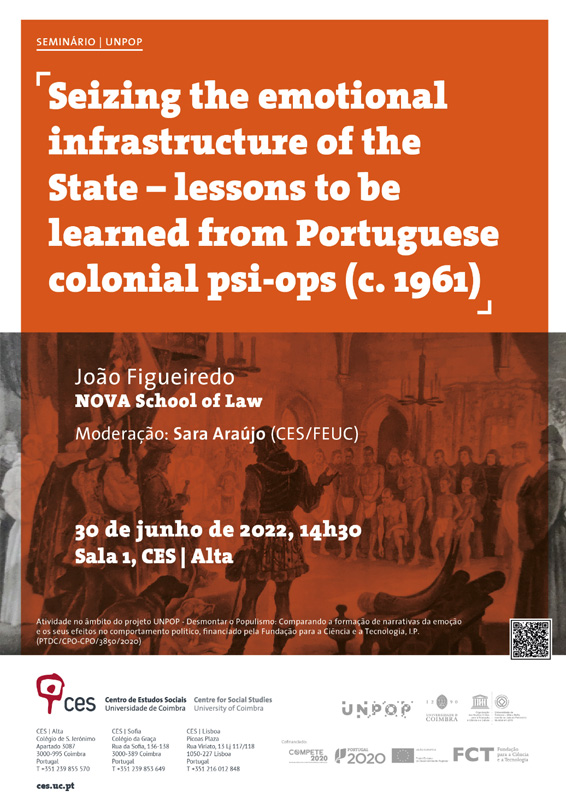Seizing the emotional infrastructure of the State – lessons to be learned from Portuguese colonial psi-ops (c. 1961)
Speaker:
João Figueiredo (NOVA School of Law)
30 de june 2022, 14h30
Sala 1, CES | Alta
Moderator: Sara Araújo (CES/FEUC)
Presentation
Scholars of the Portuguese empire often claim that Portuguese elites used myths and popular narratives to justify the expansion and maintenance of their Empire. Focusing primarily on nineteenth-century parliamentary debates, Valentim Alexandre argues that politicians successfully mobilized the myths of a ‘New Brazil’ or ‘Eldorado’ in Africa and the myth of ‘The Sacred Inheritance’ to rally support for their colonial policies. Focusing on the print culture that circulated during the same period, Beatrix Heintze and Isabel Castro Henriques argue that dehumanizing myths about African ‘Others’ often enabled imperial aggressions. Finally, ever since Cláudia Castelo deconstructed ‘Lusotropicalism,’ a great number of scholars have written about the real or imaginary impacts of this late-colonial myth (c. 1961-62). In this paper, I will question the utility of all these arguments in furthering our understanding of contemporary populism. Basing myself on Frédéric Lordon’s Imperium: Structures and Affects of Political Bodies (2022), I will argue that to understand the mechanics behind populist use of Portuguese colonial heritage we should be paying attention to the emotional infrastructures of the State, and not to the ‘truth’ content of these myths. As Lordon makes clear, this shift in perspective hinges on the adoption of a ‘critical anthropological realism’ that allows us to grasp how common affects coalesce and are then institutionally captured. I will further argue that the Portuguese Army adopted such an anthropological-realist approach when the colonial-Liberation wars erupted in the 1960s. This can be grasped by engaging with the psychological actions (psi-ops) manuals of the period.
This event belongs to project UNpacking POPulism: Comparing the formation of emotion narratives and their effects on political behaviour, which has as its main objective to explore how narratives of emotion allow a deeper analysis of the way populist phenomena constitute and influence political behaviour. Thus, the cycle of events developed throughout the project will address several issues involving the recent rise of populism, with a focus on the role of emotions - both those taken as negative such as anger and fear, and those taken as positive such as hope and love - in political behaviour.
Coordinated by Cristiano Gianolla e Lisete Mónico and institutionally hosted by the Centre for Social Studies and CINEICC - Research Centre in Neuropsychology and Cognitive-Behavioural Intervention - of the University of Coimbra, the UNPOP project is funded by the Foundation for Science and Technology, I.P. (PTDC/CPO-CPO/3850/2020).
Bio note
João Figueiredo holds a degree in Anthropology from the Faculty of Sciences and a PhD in Advanced Studies in History, branch Empire, Politics and Post-Colonialism from the Faculty of Letters of the University of Coimbra (2016). He was an Assistant Researcher at the NOVA School of Law at the New University of Lisbon between 2019 and 2022, under the project "Legal Pluralism in the Portuguese Empire (18th to 20th centuries)", and will be a fellow of the Käte Hamburger Kolleg "Legal Unity and Pluralism" at the University of Münster in 2022-23. He investigates the transition between the slave system of the Portuguese ancien régime and the systemic racism of the 20th century (c.1820-1930), approaching it from various disciplinary angles, from social history to the history of law and historical anthropology. As a citizen and militant anti-racist he has been involved in several initiatives and collaborated with NGOs such as DJASS and SOS Racismo.


